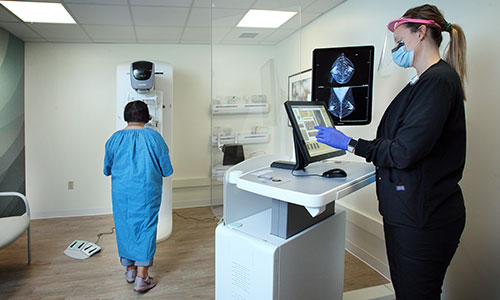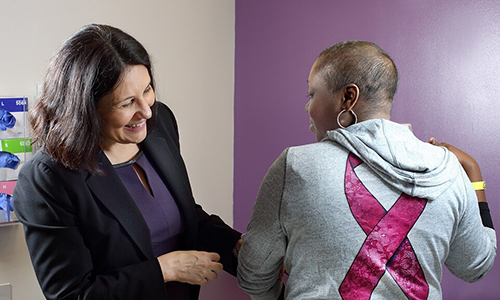Invasive Lobular Carcinoma
Featured Expert
Invasive lobular carcinoma (ILC) is the second most common form of breast cancer diagnosed in the United States, representing 10% to 15% of diagnosed invasive breast cancers. (Invasive ductal carcinoma is the most common.)
Breast surgeon Hanh-Tam Tran, M.D., explains what you should know about this type of breast cancer.
What You Need to Know
- Age increases the risk of invasive lobular carcinoma. According to the American Cancer Society, about two-thirds of women diagnosed with invasive lobular carcinoma are age 55 or older.
- Invasive lobular breast cancer can be difficult to diagnose. While other cancer cells grow and form clumps or masses, ILC cells can grow into lines that can be difficult to detect on physical exam or see on a mammogram.
- Some studies suggest that hormone replacement therapy increases the risk of these cancers.
ILC Symptoms
Some invasive lobular carcinomas do not cause symptoms. In other cases, you might notice:
- An area of thickening, swelling or fullness in the breast
- A nipple that turns inward
- A change in the texture of the breast skin
Tran stresses that you should let your doctor know about any breast changes, including persistent pain, discharge or a lump in the breast or under the arm.
Invasive Lobular Carcinoma: ILC Diagnosis
“Invasive lobular breast cancer is slow-growing compared to other breast cancers,” she says, “but because it is difficult to detect on a mammogram, these tumors can be large by the time they are diagnosed.”
Following up on an area of concern on a mammogram or your reported symptoms, your doctor may recommend additional screening studies such as:
- Breast magnetic resonance imaging (MRI): Following a mammogram, a breast MRI produces detailed images of inside the breast, which can detect additional tumors and the spread of the tumor or cancer in the breast.
- Ultrasound of the breast: Using painless sound waves directed through the skin by a transducer, ultrasound can identify tumors.
- Breast needle biopsy: After numbing the breast area, a radiologist removes a small amount of breast tissue using a needle. The sample is sent to a pathologist (a doctor who examines tissue for signs of disease), who looks at the tissue under a microscope and can confirm or rule out cancer cells.
Johns Hopkins Breast Imaging

Our experts perform both breast screening and diagnostic imaging services, conducting more than 35,000 breast imaging exams each year.
Invasive Lobular Carcinoma Treatment
“Even if an invasive lobular carcinoma is not as aggressive, it is essential to start treatment promptly once it’s diagnosed,” Tran says. “ILC can spread to the bloodstream or lymph nodes and cause metastatic breast cancer if not identified and addressed quickly enough.”
Surgery: Depending on the size and location of the ILC tumor, treatment can include lumpectomy or a mastectomy.
“Patients should choose a surgeon with experience in addressing this cancer, since the branch-like pattern of growth in these tumors can make it challenging to remove them completely along with a margin of healthy tissue that helps ensure successful treatment,” says Tran.
Adjuvant therapy (radiation and chemotherapy): In addition to surgery, your doctor may recommend treatments such as radiation or chemotherapy. Radiation addresses the cancer cells that are left behind. Chemotherapy is all-over treatment to decrease risk of recurrence elsewhere in the body, and can be used together with endocrine therapy (hormonal blockade).
Endocrine therapy (hormonal blockade): “Endocrine therapy is almost always part of the plan for treating lobular cancers,” Tran says. “Invasive lobular carcinomas are usually strongly estrogen receptor-positive, which makes them very responsive to anti-hormonal medications like tamoxifen.”
What is the prognosis for invasive lobular carcinoma?
“Your doctor can give you an idea of what to expect based on individual characteristics of the cancer cells, the stage of the cancer and other factors,” Tran says. “Early-stage breast cancers carry a higher survival rate than advanced stages. In general, with modern treatments, the prognosis of lobular carcinoma is similar to ductal carcinoma.”
Breast Health Services

Johns Hopkins breast health services include preventive and noncancerous surgical treatment, risk assessment, diagnostic screenings and treatment for breast cancer.







